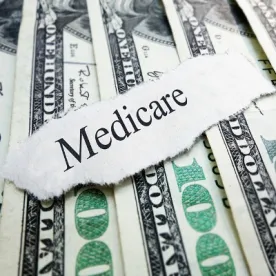Last week, a federal district court held that the Secretary of the Department of Health and Human Services (HHS) exceeded his authority when he reduced Medicare outpatient prospective payment system (OPPS) reimbursement to hospitals for most separately payable drugs purchased under the 340B program by almost 30%. The court—hearing the case for the second time after the first lawsuit was dismissed for being premature—decided that it now had subject matter jurisdiction because a claim for payment had been presented. On the merits, the court sided with the plaintiffs, holding that the Secretary of HHS’ authority to “adjust” reimbursement rates does not justify “basic and fundamental changes” to the OPPS reimbursement methodology for separately payable drugs.
The court’s ruling represents a significant victory for the plaintiffs and for 340B hospitals, and could tee up further challenges to CMS’ OPPS rules, including challenges to controversial Medicare site-neutrality payment adjustments. However, 340B hospitals will need to wait to determine what financial relief is available to them. Notably, the court granted the plaintiff’s request for a permanent injunction but determined that it could not decide on how the injunction would be implemented, or on what other relief (including financial restitution) the plaintiffs were entitled to, until it receives further briefing from the parties. The court was skittish about creating “a quagmire that may be impossible to navigate,” in part because the 340B cuts at issue were implemented in a budget neutral manner, meaning the reductions in payment for affected 340B drugs increased payments for other services and to non-340B hospitals under the Medicare OPPS. As a result, relief under consideration by the court could include payment adjustments for all OPPS providers.
The court’s order requests supplemental briefing on the appropriate remedy within 30 days, and directs the parties to provide response briefs within 14 days after the supplemental briefs are filed. A future ruling will determine what consequences the court’s order will have, and may line up further appeals of the court’s decision to the D.C. Circuit Court.
Further Exhaustion of Remedies Would Be Futile, Says the Court
As a threshold issue, the court’s rejection of the procedural arguments raised by HHS against review represents a considerable victory for plaintiffs. As in the first round of litigation, the government asserted that plaintiffs were not entitled to bring their claims in court because they had not exhausted their administrative remedies as required by 42 U.S.C. § 405(g). This time the district court did not agree that the claim was barred.
The court first observed that plaintiffs had meaningfully changed their position by having presented a claim for benefits, thereby meeting the jurisdictional first element of Section 405(g). The court then reasoned that it could waive the second element—that the administrative remedies prescribed by the Secretary be exhausted—because it was “readily apparent” that requiring exhaustion in this case would be futile. The court found it particularly persuasive that the case raised purely legal questions and there was no reason to believe HHS would change its mind because it had already considered and rejected plaintiffs’ legal arguments in notice-and-comment proceedings related to the revisions to the regulations. As the court additionally observed, HHS also did not dispute that “no administrative review body would even have authority to alter or deviate” from the final rule’s requirement, making the futility of pursuing administrative remedies especially clear.
Medicare Statute Cannot Foreclose Judicial Review of Ultra Vires Claim
The government additionally argued that specific provisions in the Medicare statute precluded judicial review of the OPPS rate adjustment for 340B drugs. The court declined to resolve the conflict in statutory interpretation between the parties on this point. Instead, it relied on the principle that the Medicare statute’s preclusion of judicial review could extend “no further than the Secretary’s statutory authority to make” the adjustments under review. As the Court explained, case law in the D.C. Circuit makes clear that judicial review under the Administrative Procedure Act is available even in the face of statutes precluding such review when an agency acts ultra vires, or in excess of its statutory authority. Characterizing ultra vires review as a narrow exception that allows otherwise unchallengeable agency action to be reviewed when it represents a patent violation of agency authority, the Court turned to an analysis on the merits with the understanding that a substantive finding that the Secretary plainly exceeded his statutory authority would mean that the court was not precluded from judicial review.
“Adjustment” Authority Is Not Plenary Power to Change Rates
The crux of the argument on the merits was whether the Secretary’s statutory authority to “adjust” the benchmark drug reimbursement rate of average sales price (ASP) plus 6% granted him the authority to reduce the rate for 340B drugs to ASP minus 22.5%. The specific “adjustment” was chosen based on MedPAC estimates of acquisition costs to hospitals for 340B drugs. The court dismissed the Secretary’s argument that his adjustment sought to mimic an alternative statutory reimbursement formula based on acquisition costs; in the court’s view, “the statutory scheme is clear that if the Secretary does not have [the necessary] data” to base reimbursement on acquisition costs, “he must calculate reimbursement rates by reference to the drugs’ average sales price.”
The bottom line for the court was that “the rate reduction’s magnitude and its wide applicability inexorably lead to the conclusion that the Secretary fundamentally altered the statutory scheme established by Congress” and thereby exceeded his “adjustment” authority.
Congress Gets the Final Word on Policy
Both the litigation and CMS’ OPPS cuts were initiated in the context of ongoing disputes about the scope and future of the 340B program. In its decision, the court acknowledged that HHS has expressed policy concerns around the 340B program and payment for 340B drugs, including the agency’s belief that large profit margins for hospitals on 340B drugs contributed to unnecessary utilization, that rising prices for certain drugs have unfairly increased cost sharing for Medicare beneficiaries, and that it is “inappropriate for Medicare to subsidize other activities through Medicare payments for separately payable drugs.” Ultimately, however, these arguments held no sway for the court, which wrote that “Congress could very well have chosen to treat Medicare reimbursements for 340B drugs differently than reimbursements for other separately payable drugs, but it did not do so.” Noting that the Secretary had the option to either collect the necessary data to set payment rates based on acquisition costs or to raise his policy disagreement with Congress, the court criticized what it viewed as an attempt to “end-run Congress’s clear mandate.”
What’s Next?
Both 340B and non-340B hospitals should carefully monitor how these remedies are applied, as the relief has the potential to redistribute billions of dollars in revenue among Medicare-participating hospitals. The court’s ruling is likely to also affect the additional cuts CMS for 340B hospitals that CMS has included in the 2019 OPPS, and could increase pressure on Congress to address the 340B Program through legislation. Once the court’s ruling on relief is issued, the decision may be appealed to the United States Court of Appeals for the District of Columbia.





 />i
/>i

